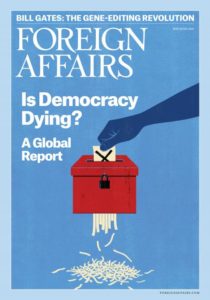 In its 2018 National Defense Strategy, released in January, the administration of U.S. President Donald Trump correctly identified great–power competition as the United States’ central security challenge. In recent years, rival states such as China and Russia have increased their ability to project power and undermine the U.S.-led liberal international order, even as Washington has struggled to respond, argue Richard Fontaine and Daniel Twining, presidents of the Center for a New American Security and the International Republican Institute, respectively.
In its 2018 National Defense Strategy, released in January, the administration of U.S. President Donald Trump correctly identified great–power competition as the United States’ central security challenge. In recent years, rival states such as China and Russia have increased their ability to project power and undermine the U.S.-led liberal international order, even as Washington has struggled to respond, argue Richard Fontaine and Daniel Twining, presidents of the Center for a New American Security and the International Republican Institute, respectively.
To overcome its geopolitical rivals, the United States must go beyond building a stronger military or enforcing economic rules; it must double down on its support for democracy around the world. Authoritarian powers such as China and Russia are working to subvert democracy where it exists, snuff it out where it is new, and keep it away where it is lacking. They see their assault on democracy as a matter not of values but of strategic advantage, whereby they can enhance their own power by eroding the internal cohesion of democracies and the  solidarity of democratic alliances, they write for Foreign Affairs.
solidarity of democratic alliances, they write for Foreign Affairs.
China and Russia’s influence campaigns require a U.S. response—for reasons not of Wilsonian idealism but of hard-nosed realism, Fontaine and Twining contend:
- The top priority should be to make open societies more resilient and capable of defending themselves against external threats. During the Cold War, U.S. grand strategy revolved around protecting democratic strongpoints in Asia and Europe. Today, the United States must first defend itself against autocratic penetration and subversion, while also looking to protect allies and partners such as Australia, France, Germany, Mexico, and the United Kingdom…
- The second priority should be to protect fragile nascent democracies—countries that have recently democratized but where democracy is still under assault from internal or external forces. Ukraine is an important example: both its government and a majorityof its population support democratic consolidation and integration into the West, yet Moscow is pursuing hybrid war to subvert the country’s sovereign institutions….
 The third priority should be encouraging democratic openings in autocratic environments. Washington may lack the leverage to mitigate repression in countries such as China, Iran, North Korea, and Russia, but there are other places where democratic practice may find more fertile ground, including Angola, Belarus, Central Asia, Ethiopia, and Venezuela. …..
The third priority should be encouraging democratic openings in autocratic environments. Washington may lack the leverage to mitigate repression in countries such as China, Iran, North Korea, and Russia, but there are other places where democratic practice may find more fertile ground, including Angola, Belarus, Central Asia, Ethiopia, and Venezuela. …..
“Efforts to support democracy should emphasize not a missionary vision of spreading ‘American’ values around the world but, rather a hard-edged, practical strategy of empowering countries to protect their own sovereignty,” they add. “By mobilizing to protect against the establishment of authoritarian great-power spheres of influence, the United States can offer a vision that appeals to both the values and interests of countries around the world.”







